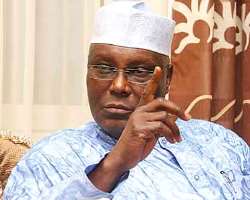My father was jailed for refusing to let me attend school – Atiku

Former Vice President Atiku Abubakar stunned his audience in far away Geneva, Switzerland when he recalled how his late father was jailed for refusing to let him attend school in his hometown of Jada, Adamawa State.
The former Vice President made the startling revelation yesterday in remarks he made on the occasion of the conferment of an honorary doctorate degree on him by the Geneva School of Diplomacy and International Relations.
“When my father was put in jail by local authorities because he needed my assistance with herding the livestock, it seemed like a harsh punishment,”
Atiku reminisced.
He, however, noted “were he to be alive to witness this day (yesterday) and the last 30 or so years of my life I am sure that he would exclaim “wow! Education pays after all.”"
The founder of the American University of Nigeria (AUN), Yola recalled that as a young lad growing up in his rustic village of Jada, he had dreams, but that it was education that made his dreams come true.
According to him, “education is what brought me in contact with members of the United States of America's Peace Corps when I was still a little boy; a contact and interaction that would have profound impact on my life, especially my love for education and service.”
While underscoring the imperative of education to personal growth and development, the former Vice President said it gave him the friends he made across Nigeria as he attended high school and university; gave him a job in the Nigerian civil service; and provided him with opportunities to meet and form more life-long friendships from across the world.
Atiku Abubakar attributed the modest achievements he has made in business and politics and the contributions in improving the lives of others to education.
He stressed that education is what has informed his determination to give back to society, especially through education.
He noted that the centrality of education in the improvement of the human condition is one reason why public policy must seek to always improve the quality of and access to public education everywhere in the world, especially in developing countries like Nigeria.
He advised parents not to choose career options for their children but allow them to discover their innate potentials by charting their own preferred discipline.
“A young friend of mine, who heads the human resources department of an organization in Nigeria, called me up one night about seven months ago and said he came across an application for employment by one of my children and wondered whether I consented to my child applying to work in that organization.
“I asked why he needed to clear that with me first and he said he thought that I would prefer that my child works in one of my establishments. I then told him that I do not choose careers for my children. I owe them good education; I support them to acquire good education. What they do thereafter is up to them as adults,” Atiku said.
Others who received honorary doctorate degrees from the same institution are His Excellency (Dr.) Oguz Demiralp, Ambassador of the Republic of Turkey and His Excellency (Dr.) Kassym-Jomart Tokayev, Director General of the United Nations Office at Geneva (UNOG) and Honorary Dean of the Geneva School of Diplomacy.
